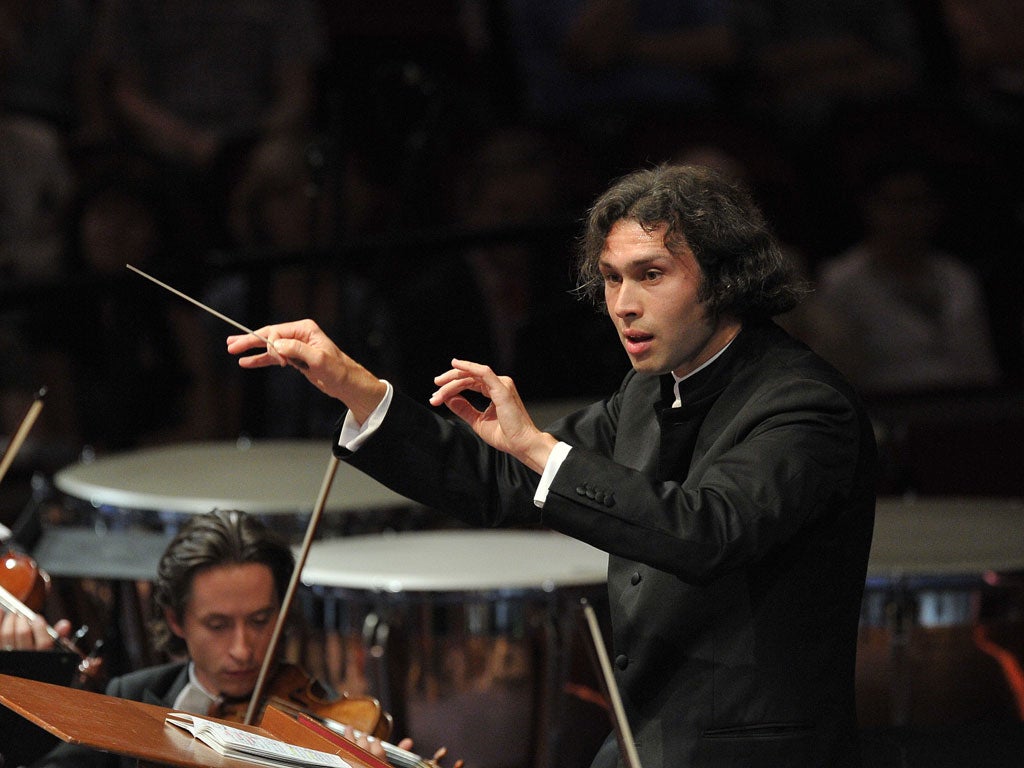IoS classical review: LPO/Jurowski, Royal Festival Hall, London London Sinfonietta, Purcell Room, London LSO/Bychkov/Kavakos, Barbican Hall, London
Death and grief prompt searing scores, interpreted with pathos and passion

On 24 July 1933, Arnold Schoenberg reconverted to Judaism. A yellowed slip of headed paper from the Paris synagogue records the presence of Marc Chagall among the witnesses to a ceremony unrecognised in religious law but of deep significance to the composer.
Schoenberg, who had fled Berlin in May, wrote no music during his six-month stay in Paris. Instead, he drafted a Four Point Program for Jewry, listing the Jewish populations of Germany, Austria, Czechoslovakia, Hungary, Italy, Poland, Romania, Lithuania, Latvia, Yugoslavia and Greece by number, and asking: "Is there room in the world for almost seven million people? Are they condemned to doom? Will they become extinct? Famished? Butchered?" By the time he completed his essay, in Los Angeles, in October 1938, Austria had been absorbed into the Third Reich.
In three unconnected concerts last week, we heard a series of reactions to terror and injustice, statements of resistence and survival. Vladimir Jurowski conducted a searing account of Schoenberg's 1947 testament A Survivor from Warsaw with the London Philharmonic Orchestra. Leonidas Kavakos and Semyon Bychkov gave a spacious reading of Berg's 1935 Violin Concerto "To the memory of an angel" with the London Symphony Orchestra. With the London Sinfonietta's intimate performance of Messaien's 1941 Quartet for the End of Time (written and premiered in a prisoner-of-war camp), it seemed as though an unannounced festival of remembrance were taking place.
Bach was one touchstone: his chorale "Es ist genug" quoted in the poised woodwind refrain of the second movement of Berg's concerto as a cooling hand to a fevered brow; the Sarabande from his Partita in D minor offered as a tender postscript by Kavakos. Beethoven was another, as the overture to Fidelio opened an LPO performance in which the whiplash motif of the Fifth Symphony sounded in response to the last words of Julius Fucik (a Czech journalist tortured and executed by the Nazis in 1943) as set to music by Luigi Nono, Schoenberg's son-in-law, in a cantata of the same name.
Of the three programmes, Jurowski's "concert in five movements" was the most blatant in its intention to make us hear differently, to recognise parallels between two dictators hailed as heroes and monsters. Schoenberg's 1942 melodrama Ode to Napoleon Bonaparte opens, like Beethoven's Fifth, with a reaction, as the piano staggers and reels from an unseen blow. Sometimes there is an almost Shakespearean variety of emphasis, a caustic playfulness in the nagging figures for strings. Elsewhere, Byron's ballad metre lollops into banal regularity. With the whoop and growl of sprechstimme, narrator Robert Hayward held firm while pianist Catherine Edwards dazzled.
A Survivor from Warsaw is both more disciplined and more imaginative, the flecks of woodwind, splinters of tuned percussion and accelerating snare-drum unsettlingly direct in Schoenberg's evocation of the ghetto. Nono's Julius Fucik quotes both this and Beethoven, its musical language still more spare, a dialogue between two drummers as much as it is between Fucik (baritone Omar Ebrahim) and his interrogator (actor Malcolm Sinclair). Tautly staged by Annabel Arden, torchlight dancing on Ebrahim's face as he confesses an inextinguishable joy, recalling "some Beethoven theme or other", it is an extraordinary work. Dramatic momentum was sadly lost between the first and second movements of the Beethoven, Jurowski's interpretation somewhat arid in its micro-management. But what a bold programme.
In London Sinfonietta's representation of Quartet for the End of Time with Netia Jones and the mixed-media partnership Lightmap, the barbed wire of Stalag VIIIA melted away as ear and eye were drawn to cellist Tim Gill and pianist John Constable's "Louange à l'Eternité de Jésus". Clarinettist Timothy Lines's dark-hued "Abîme des oiseaux" and violinist Jonathan Morton's steadily shimmering "Louange a l'immortalité" defied visual interpretation. Lightmap's most impressive contribution was to balance the divine dazzle of Messaien's faith with the domestic warmth of maternal love in Calm Lamentation and The Dove – piano preludes played earlier in the programme. Family portraits and a poem by Cecile Sauvage, showed a child loved deeply and well.
At the Barbican, the London Symphony Orchestra stared into the abyss of Berg's violin concerto. Leonidas Kavakos's effortlessly sustained tone and Bychkov's balancing of textures seemed to pull back the voile curtains of the sick-room of Berg's inspiration, little Manon Gropius, and to see the sickness of a city, a culture, a continent. The "home-movie" moments of gaiety felt unusually intrusive, the spasms of pain unbearable, the fragments of waltzes limp and awkward.
In the first movement of Mahler's First Symphony, written in the wake of the Russian pogroms, Bychkov and the LSO offered a Beethovenian Big Bang; in the second, a grotesque parody of collective disinhibition; in the third, hatred and mockery. The blazing tumult and silky melody of the finale is hard to forget. "From inferno to paradise" was Mahler's description.
Critic's Choice
Singers Allison Bell and Melanie Pappenheim, pianist Danny Driver, conductor Charles Hazlewood and the BBC Concert Orchestra present H7STERIA, music on madness and delirium by Schoenberg, Maxwell Davies, Pook and Muse, at the Queen Elizabeth Hall, London (Mon). Andris Nelsons conducts the CBSO in Bruckner's Eighth Symphony and Claire Booth and BCMG perform Schoenberg's Pierrot Lunaire, at Birmingham's Symphony Hall (Thu).
Join our commenting forum
Join thought-provoking conversations, follow other Independent readers and see their replies
Comments